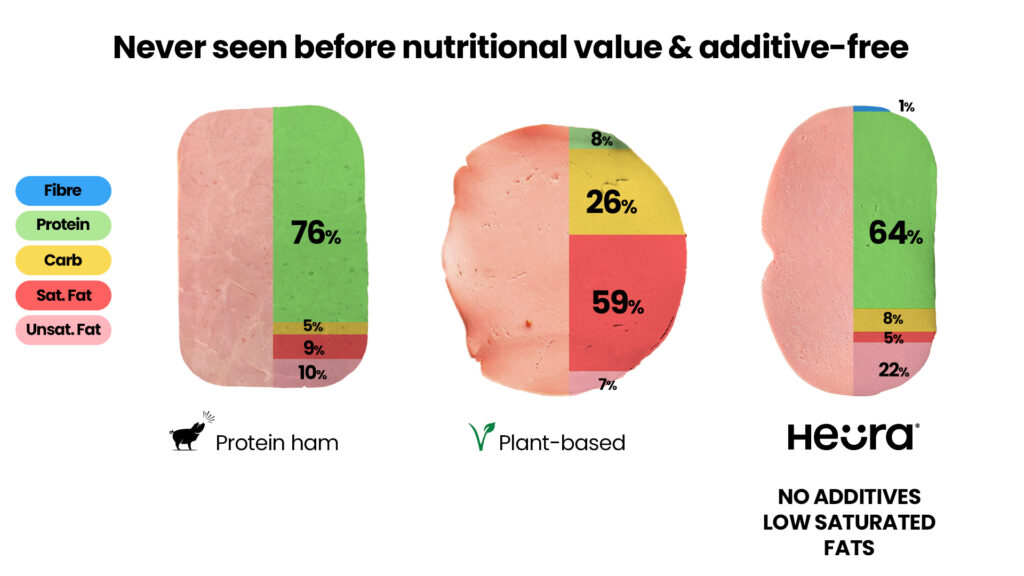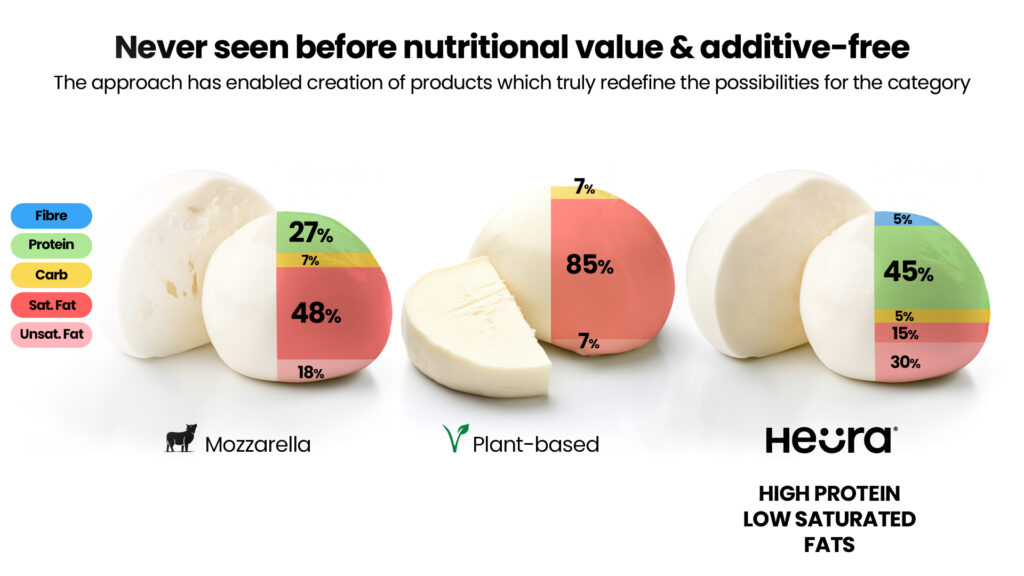Heura Goes Beyond Meat with Healthier Plant-Based Cheese & Pasta to Take On UPF Label
5 Mins Read
Spanish plant-based pioneer Heura is expanding its technology to offer nutrient-dense cold cuts, cheese, and pasta, in a bid to move past the ultra-processed food label.
It may account for a quarter of Spain’s plant-based meat market, but Heura isn’t satisfied with that – part of an industry inundated with ultra-processed concerns, the startup is doubling down on its technology to expand into new categories.
At Future Food-Tech London, the Barcelona-based firm showcased a glimpse of its future. By combining plant proteins and healthy lipids, Heura is unlocking textures in food categories where it has been “technologically impossible” to do so until now.
The company – famous for its clean-label vegan chicken, sausages, burgers and seafood – is now moving into cold cuts, cheese, and pasta. The goal is to tackle a wider range of categories with nutrient-dense alternatives that do away with the need for additives, modified starches, and saturated fats, and entice a larger share of consumers drawn away from ultra-processed food (UPFs).
“Rather than focusing solely on new ingredients, we need better technologies for product design,” said Heura co-founder and CEO Marc Coloma. “We no longer need to wait years for new functional ingredients that biomimic animal proteins. We can now develop the next generation of products at scale, directly from plant proteins.”
Heura goes all in on nutrition with category expansion

Heura’s innovation is based on a patent-pending technology that uses simple thermo-mechanical techniques to create product matrices, in what is described as a scalable process.
The company argues that while the alternative protein industry has been focused on upping the sustainability and nutrition value of meat analogues, Heura’s product structuring tech can replace nutrient-light ingredients with plant proteins in new categories.
For example, pasta. At the London event, Heura served up spaghetti made from wheat semolina and soy protein isolate, amping up its protein content from around under 20% all the way to 50%. It also brings the carbohydrate content down by 74%.

Then there were the vegan cheeses, a major pain point for dairy eaters, who remain unsatisfied with the taste and texture of these analogues. Heura is working on several prototypes, and says it can do as many cheeses as possible, which contain 20% protein and low saturated fat. At Future Food-Tech, it exhibited plant-based versions of feta, parmesan, mozzarella, and melty cheese.
Finally, it also showcased the cold cuts – after all, plant-based meat is Heura’s bread and butter. These are described as the only vegan deli meats “with high protein, low saturated fat, and no additives while having an unparalleled sensory experience”.
“Today’s prototypes shatter expectations, proving that exceptional taste and unmatched nutritional value aren’t goals for the future – they’re realities we can deliver right now,” said Coloma.
The company said it wants to provide healthier options to consumers, and diving into newer categories that can help fight the food industry’s challenges will help maximise its impact and “democratise” plant proteins.
“Who wouldn’t want to replace excess saturated fats, simple carbohydrates, and unnecessary additives with nutrient-dense products made from plant proteins and healthy lipids? And we can do this by leveraging readily available, consumer-friendly ingredients that require no regulatory approval,” says Coloma.
Debunking UPFs with technology

The new product prototypes are, of course, a work in progress, and serve as an example of the solutions Heura plans to offer by licencing its technology to industry-leading companies. The dairy-free cheese, high-protein pasta, and clean-label cold cuts are set to grace grocery shelves in early 2026.
In preparation for that, the Spanish startup is filing six patents in the next nine months to cover the new categories with its Good Rebel technology and “redefine nutritional value standards across the food industry”.
The proprietary process, unveiled in April 2023, relies upon mathematical models similar to AI to develop breakthrough solitons based on new scientific knowledge, instead of optimising technologies based on existing data, Coloma told Green Queen last year. The tech can create additive-free plant-based foods with superior sensory and nutritional values and fewer ingredients, using only protein, water and oil to structure the product.
“These new technologies are set to transform current food production methods, but their real power lies in scaling efficiently and adapting to regional consumer preferences. That’s why we’re forging partnerships with industry leaders to accelerate a change that no one can drive alone,” said Coloma.
The move comes at a time when UPFs dominate our diets and conversations around food. Industry giants like Beyond Meat have reformulated their products and marketing to appease these concerns, while whole-food products have gained popularity.
The plant-based sector has been unfairly linked to ill health effects of certain UPFs, and experts say that decoupling processing with nutrition is critical. In Europe, 54% of people avoid meat analogues because they’re ultra-processed – but within Spain, only 8% feel a vegan burger is unhealthier than conventional beef if it’s ultra-processed, according to a survey conducted by Heura.
All UPFs are not the same, and if plant-based analogues to meat and dairy are well-formulated, they usually rank high on the nutrition front – paying attention to the ingredient quality and how it’s integrated into diets is key, the company says.
There are hardly any brands better placed to spread this message than Heura, which has raised €88M to date and is responsible for four out of the five bestselling vegan products in Spain. Last year, it grew sales by 22%, reaching €38.3M, and it’s coursing towards profitability by 2025. Can its new products capture grocery baskets the same way it has with meat analogues?



